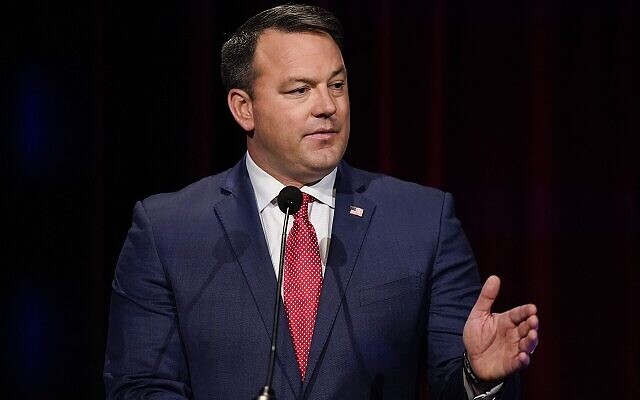Decision Not to Run Opens Number Two Job
Lieutenant governor contest is one where Libertarian candidate could force a runoff.
Dave Schechter is a veteran journalist whose career includes writing and producing reports from Israel and elsewhere in the Middle East.
The duties of Georgia’s lieutenant governor include presiding over the state Senate, overseeing committee assignments and selecting committee chairs.
Republican Lt. Gov. Geoff Duncan opted not to seek re-election. He rejected former President Donald Trump’s disproven claims of having won Georgia’s 2020 presidential vote and urged Republicans to look forward to, rather than fixate on, a presidential election loss.
Georgia law requires that the winner of an election receive a majority of the votes cast. The race to succeed Duncan is among those where a Libertarian candidate could force a Dec. 6 runoff. In an Atlanta Journal-Constitution poll of 861 likely voters, conducted Sept. 5-16, Republican state Sen. Burt Jones was backed by 43.4 percent, Democrat Charlie Bailey 33.1 percent, and Libertarian Ryan Graham 7.6 percent, while 15.9 percent remained undecided.

Trump’s endorsements had a mixed record in Georgia’s May 24 Republican primary, but Jones was among the winners. Jones, who has represented state Senate district 25 since January 2013, captured 50.7 percent of the vote against three other hopefuls.
Jones was one of 16 “fake electors” that Georgia’s Republican Party chair David Schafer organized in a failed effort to cast Georgia’s 2020 Electoral College presidential vote, a scheme that is being investigated by a Fulton County grand jury.
During a mid-October debate sponsored by the Atlanta Press Club, Bailey said: “The truth is, Mr. Jones, what you did was un-American and unpatriotic. You don’t get to decide for the people of Georgia who serves them and who is their elected leader. That’s their choice, not yours.”

Jones said that Georgia voters have other concerns: “What they are talking to me about is gas prices, 40-year high inflation, crime that’s going on, and then what’s going on in our education system. And that’s what I’ve been focused on.”
Rather than assigning blame to one party, Graham said: “The truth is this inflation has been bipartisan,” he said.
Jones’ platform has included eliminating the state income tax — which last year brought in about $20 billion, some 60 percent of the state’s tax receipts a year — as well as giving parents more sway in public education decisions, allocating more money to private and charter schools, reducing the cost of college and technical education, and increasing pay and benefits for law enforcement and first responders.
Bailey, an attorney and former Fulton County gang prosecutor, defeated former Atlanta city councilman Kwanza Hall in a June 21 runoff after finishing first among nine candidates in the May 24 Democratic primary. He was unsuccessful in a 2018 race against Georgia’s current attorney general, Republican Chris Carr. Bailey’s campaign priorities have included improved pay for police and teachers, reducing class size, bringing back free technical college tuition, and expanding Medicaid.

Graham, an information technology project manager, chairs Georgia’s Libertarian Party. His platform rests on “getting government out of the way and letting individuals create solutions.” He opposes mandated school curriculums and government intrusion in what he terms “bodily autonomy and consent.” He favors ending civil asset forfeiture, ending sovereign immunity, and eliminating the state’s medical Certificate of Need, under which the Department of Public Health evaluates plans for new or expanded health care services.
According to the most recent information from the Georgia Campaign Finance System, Jones reported contributions totaling $12.3 million, expenditures of $6.6 million, and $1.9 million cash available. Bailey reported contributions of $2.3 million, expenditures of $1.1 million, and $656,000 cash available. Graham reported contributions of $8,200, spending of $5,300, and nearly $2,900 available.




comments